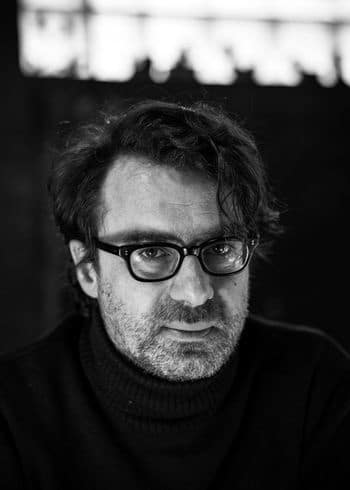‘Aria van professor Bentoné’ by Dirk Elst: Homage to Stunted Lives
Living in poverty demands creativity and courage. In Aria van professor Bentoné (Professor Bentoné’s Aria), Dirk Elst manages to describe living that way without romanticising it, but with neither complaint nor self-pity about its hardships.
We meet the narrator from Aria van professor Bentoné (Professor Bentoné’s Aria) while he takes a shower at the swimming pool in Ostend. He is looking for that bathroom feeling. But he is well aware his search doesn’t end here, in this shower, where he fantasizes about the actress in one of the shower gel ads he remembers from the ’80s. The thought of the wild scent of limes does not stop him longing for the comfort of a bathroom of his own.
 Dirk Elst
Dirk ElstThe thing is, he doesn’t have one in the old, dilapidated printing works where he is living temporarily. His presence there is tolerated by the people of the community workshop and kitchen who work there during the day. The kitchen is especially useful because the volunteers are friendly and generous. On the other hand, it means his armpits often smell like leeks or cabbage. He needs his own bath. He buys one in Lidl: a large plastic moving box, light and easy to manoeuvre yet sturdy, good for filling with hot water from the large pot he finds on the stove.
And so his new bathroom ritual is born, which involves listening to the Aria della Monica, a composition by Girolamo Frescobaldi, about the stunted life of an intelligent young girl. She is sent to a convent by her family to pledge her love to Jesus, but also to escape the poverty that has befallen her once illustrious family.
That bathroom ritual is a regular feature in the book, as our “professor Bentoné” – the nickname given to the narrator at the chemical plant where he earns a living as a temp worker – slowly reveals the story of his life and his family. The symbolism is plain, but not overdone. The recurring bathroom scene illustrates both the monotony of living in poverty and the importance of such rituals. They provide something to hold onto in a precarious, overwhelming world, where danger and misfortune lie in wait at every turn, in white Volvos and uniformed officials.
Dirk Elst (b. 1975) earned his spurs as a musician, but also as a writer of short stories, poetry, theatre scripts and radio plays. He brings that experience to this debut novel.
Elst’s scenes are cinematic, with credible dialogues, and he captures his observations in plain language, with beautiful imagery. A goat’s droppings become “soft bullets” that fall to the ground, a windy walk along the sea Elst describes as being swept slightly out of yourself, and even walking into a shop takes on meaning: “Our world begins in the space between two strangers.”
Especially beautiful is how he manages to portray what it feels like to come to among the living after fainting. And also particularly beautiful is the scene in which the reading of the beheading scene from Dostoevsky’s The Idiot is interwoven with a bout of lovemaking.
The professor finds temporary solace with an ex, an artist, but he also notices how the past has regained the upper hand since her arrival. We get to know the backstory of Professor Bentoné, through flashbacks to his childhood growing up in the family of a poor but passionate union militant, who lets the strike in the metal factory go on just a little too long.

By not placing the flashbacks in separate chapters, Elst has not made it easy for himself. They crop up everywhere, sudden thoughts, ideas and memories that arise and disappear just as quickly. That is clever, it is how memories work. He suddenly thinks about what it was like to go swimming with his sister Anna, for example, or how they would hide in the grainfield next to their house, but also how his family couldn’t afford to treat her leukaemia, while much richer people managed to fundraise for their sick children. The inequality fuels Professor Bentoné’s rebellious spirit, but also his creative streak and sense of humour.
At no point does this aria lament how miserable life is, how hard and unfair. In this way Elst paints a picture of a world that we know too little about. He does this in the tradition of J.M.H Berckmans, but less raw, and with a dry humour that is sometimes reminiscent of Erik Vlaminck’s character Dikke Freddy. We would like to learn more from this professor.
An excerpt from 'Aria van professor Bentoné', as translated by Paul Vincent
As I hold the door of the locker shut with my shoulder and turn the key, an unpleasant thought shoots through me, frustration rears its head: the awareness that my quest for the bathroom feeling doesn’t stop in the municipal swimming pool of Ostend. Nevertheless, in a little while, when I am standing under the shower, I will close my eyes against my better judgement, groan softly, perhaps even hum a song, as I let my face empty under the warm torrent, like a babe in some commercial for a new fragrance of shampoo from the 1980s. It will look less sexy but just as sultry. Still the secure feeling of a bathroom will not descend on me.
Once an insistent idea takes control of your head, you can never get it out. However hard you try. The imaginary world that you are living in has to fight too hard against the reality lurking behind that idea. Something is always missing from life that you think will make you happy. In my case that is among other things a bathroom. Another option would be to down several half-litres of cheap beer in order to soften the cold décor of the drama I live in with the haze of drunkenness. When reality doesn’t put a golden halo around things, you’d do better to take the path of intoxication and make the lout that reality sometimes is into a gentleman. Before you know it you’re playing the leading role in your own serial. I won’t let it get to that point.
Meanwhile a bunch of keys slides past over the wet floor. The swimming pool’s cleaner had just given it a kick. Her flip-flops splash on the tiles of the harshly-lit corridor while her hips set the rhythm. They seem to soften the smacking sound. Whenever I see her, I feel at once at home and out of place. For her charm alone I’d like to maintain that I am definitely in a bathroom in some spa town or other. One of the neon bulbs flickers on and off. I squeeze the rubber band, from which the key and the number of the locker are hanging, round my wrist. Then I fold my towel in half and roll the can of shampoo up in it. I look at the red nail polish on her fleshy toes, which push against the blue sole of her flip-flops.
I squeeze the can of shampoo rolled in the towel tight in my armpit as if it were a set of bagpipes. When she raises her left foot and then scratches her calf, the light-blue dress that is stretched round her body, could burst open at any moment. Above the knee, which just now was hidden under the bottom button, the hem creeps up and reveals the inside of her thigh. Meanwhile she scratches her heel and sighs almost inaudibly, with a mixture or irritation, melancholy and pleasure, which she cannot let go of and which is determined to keep the itch alive. With the other hand she looks for a handhold and shuts one of the lockers that are hanging open, like an air hostess who has an arrangement with herself before speaking to passengers. The can of shampoo in my armpit is half pushing its way out of the rolled-up towel. It is going to fall out any minute. Using my elbows, I manoeuvre it back in.
Dirk Elst, Aria van professor Bentoné, Fluxenberg, Wolvertem, 2021, 194 pages












